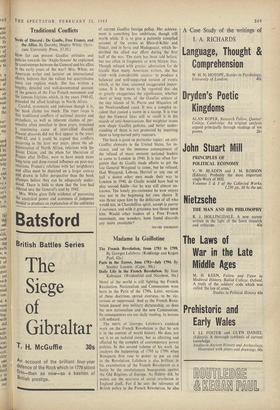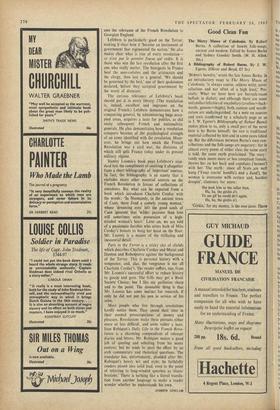Madame la Guillotine
Daily Life in the French Revolution. By Jean Robiquet. (Weidenfeld and Nicolson, 36s.)
MOST of the world is still fighting the French Revolution. Nationalism and Communism were born in the Paris of the 1790s. Later, versions of these doctrines spread overseas, to be vic- torious or suppressed. And as the French Revo- lution passed into military dictatorship, so does the new nationalism and the new Communism. Its consequences are our daily reading, its lessons still unheard.
The merit of Georges Lefebvre's standard work on the French Revolution is that he sets it in the context of world history. He does not see it as an isolated event, but as affecting and affected by the complex of contemporary power politics. In this second volume of his work. he analyses the happenings of 1793 to 1799; when Bonaparte first rose to power to put an end to the Revolution. Lefebvre is also brilliant in his examination of the French Revolution as a battle by the revolutionary bourgeoisie against the Old Rdgimes of Europe. As Haldvy did, he points out the nearness of social revolution in England itself. For if he sees the relevance of British policy to the French Revolution, he also sees the relevance of the French Revolution to Georgian England.
Lefebvre is particularly good on the Terror, making it clear how it `became an instrument of government that regimented the nation.' He also
makes clear what is true of every revolution— re tee.s.t pas le premier fracas qui colite. It is
those who win the last revolution after the first
one who really matter. The bourgeois in France beat the sans-culottes and the aristocrats and
the clergy, then lost to a general. `We should be governed by the best,' one of their spokesmen declared, before they accepted government by the worst of dictators.
The curious relevance of Lefebvre's book should put it in every library. (The translation is, indeed, excellent and improves on the original French.) Lefebvre demonstrates how a conquering general, by administering huge occu- pied areas, acquires a taste for politics, as did many subsequent French and nationalistic generals. He also demonstrates how a revolution conquers because of the psychological strength of an army identified with the revolution. More- over, he brings out how much the French Revolution was a civil war, the divisions of which still split France today under its present military regime.
Stanley Loomis's book pays Lefebvre's stan- dard text the compliment of omitting it altogether from a short bibliography of 'important' sources. In fact, the bibliography is so scanty that it excludes many other essential sources on the French Revolution in favour of collections of anecdotes. But what can be expected from a book which introduces Charlotte Corday with the words : 'In Normandy, in the ancient town of Caen, there lived a comely young woman,' whose `dreaming eyes' left the good souls of Caen ignorant that 'wilder passions than love will sometimes seize possession of a high- minded woman's heart.' Later on, we are told of a passionate Jacobin who seizes both of Miss Corday's breasts to bang her head on the floor. Mr. Loomis is a master of the titillating and inessential detail.
Paris in the Terror is a sticky clot of cliches which describes Charlotte Corday and Marat and Danton and Robespierre against the background of the Terror. This is personal history with a vengeance, and, alas, the vengeance is not all Charlotte Corday's. The reader suffers, too, from Mr. Loomis's successful effort to reduce history to gossip and gore. The frills may get a Book Society Choice; but I like my guillotine sharp and to the point. The damnable thing is that Mr. Loomis has some instinct for research, if only he did not put his pen in service of his sales.
Most people who live through revolutions hardly notice them. They spend their time in their normal preoccupations of money and pleasure. Revolutions make these pursuits either more or less difficult, and seem rather a bore. Jean Robiquet's Daily Life in the French Revo- lution is a charming compendium of relevant diaries and letters. Mr. Robiquet makes a good job of quoting and selecting from his many sources; but he tends to spoil the effect by an arch commentary and rhetorical questions. The translator has, unfortunately, plodded after Mr. Robiquet's heavy wit and style; he faithfully renders plomb into solid lead, even to the point of referring to long-winded speeches as `elucu- brations.' There is nothing like a literal transla- tion from another language to make a reader wonder whether he understands his own.
ANDREW SINCLAIR



































 Previous page
Previous page